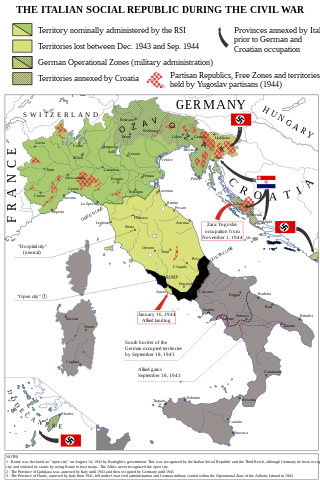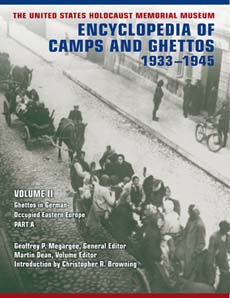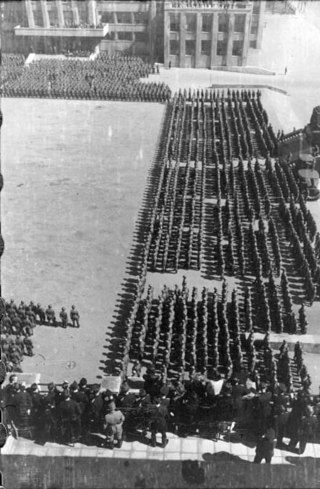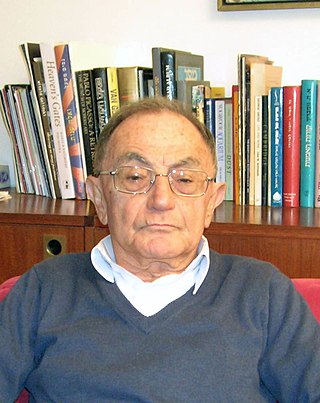
World War II or the Second World War, often abbreviated as WWII or WW2, was a global conflict that lasted from 1939 to 1945. The vast majority of the world's countries, including all of the great powers, fought as part of two opposing military alliances: the Allies and the Axis. Many participants threw their economic, industrial, and scientific capabilities behind this total war, blurring the distinction between civilian and military resources. Aircraft played a major role, enabling the strategic bombing of population centres and the delivery of the only two nuclear weapons ever used in war.

Vergangenheitsbewältigung is a German compound noun describing processes that since the later 20th century have become key in the study of post-1945 German literature, society, and culture.

Richard Conrad Lukas is an American historian and author of books and articles on military, diplomatic, Polish, and Polish-American history. He specializes in the history of Poland during World War II.

The issue of why the Allies did not act on early reports of atrocities in the Auschwitz concentration camp by destroying it or its railways by air during World War II has been a subject of controversy since the late 1970s. Brought to public attention by a 1978 article from historian David Wyman, it has been described by Michael Berenbaum as "a moral question emblematic of the Allied response to the plight of the Jews during the Holocaust", and whether or not the Allies had the requisite knowledge and the technical capability to act continues to be explored by historians. The U.S. government followed the military's strong advice to always keep the defeat of Germany the paramount objective, and refused to tolerate outside civilian advice regarding alternative military operations. No major American Jewish organizations recommended bombing.

Mihailo Olćan was a Serbian soldier and politician. During World War II, he served as the Minister for the Economy in Milan Nedić's German-installed Government of National Salvation which operated in the Territory of the Military Commander in Serbia between 1941 and 1944. He fled Yugoslavia towards the end of the war and emigrated to Australia, where he died in 1961.
Dagmar Herzog is Distinguished Professor of History and the Daniel Rose Faculty Scholar at the Graduate Center, City University of New York. She has published extensively on the histories of sexuality and gender, psychoanalysis, theology and religion, Jewish-Christian relations and Holocaust memory, and she has edited anthologies on sexuality in the Third Reich, sexuality in twentieth-century Austria, and the Holocaust.

Gottlieb Hering was an SS commander of Nazi Germany. He served in Action T4 and later as the second and last commandant of Bełżec extermination camp during Operation Reinhard. Hering directly perpetrated the genocide of Jews and other peoples during The Holocaust.

The Investigation (1965) is a play by German playwright Peter Weiss that depicts the Frankfurt Auschwitz Trials of 1963–1965. It carries the subtitle "Oratorio in 11 Cantos". Weiss was an observer at the trials and developed the play partially from the reports of Bernd Naumann. The work premiered on October 19, 1965 on stages in fourteen West and East German cities and at the Royal Shakespeare Company in London. In 1966 the production was presented at the Royal Dramatic Theatre in Stockholm which featured sets and costumes designed by Weiss's wife, Gunilla Palmstierna-Weiss, and was directed by Ingmar Bergman.

This is a list of books about Nazi Germany, the state that existed in Germany during the period from 1933 to 1945, when its government was controlled by Adolf Hitler and his National Socialist German Workers' Party. It also includes some important works on the development of Nazi imperial ideology, totalitarianism, German society during the era, the formation of anti-Semitic racial policies, the post-war ramifications of Nazism, along with various conceptual interpretations of the Third Reich.
Gilad Margalit was an Israeli historian, writer, and professor in the Department of General History at the University of Haifa.

The Holocaust in Italy was the persecution, deportation, and murder of Jews between 1943 and 1945 in the Italian Social Republic, the part of the Kingdom of Italy occupied by Nazi Germany after the Italian surrender on September 8, 1943, during World War II.

The victim theory, encapsulated in the slogan "Austria – the Nazis' first victim", was the 1949–1988 Austrian ideological basis formed by Austrians themselves under Allied occupation and independent Second Austrian Republic. According to the founders of the Second Austrian Republic, the 1938 Anschluss was an act of military aggression by the Third Reich. Austrian statehood had been interrupted and therefore the newly revived Austria of 1945 could not and should not be considered responsible for the Nazis' crimes in any way. The "victim theory" which was formed by 1949 insisted that all of the Austrians, including those who strongly supported Hitler, had been unwilling victims of the Nazi regime and were therefore not responsible for its crimes.
The Police Regiment South was a formation of the German Order Police, the German national uniformed police force, during the Nazi era. During Operation Barbarossa, it was subordinated to the Schutzstaffel (SS) and deployed in German-occupied territories, specifically the Army Group South Rear Area. In July 1942, its three constituent battalions were redesignated as the 10th Police Regiment.

Encyclopedia of Camps and Ghettos, 1933–1945 is a seven-part encyclopedia series that explores the history of the concentration camps, ghettos, forced-labor camps, and other sites of detention, persecution, or state-sponsored murder run by Nazi Germany and other Axis powers in Europe and Africa. The series is produced by the United States Holocaust Memorial Museum (USHMM) and published by Indiana University Press. Research began in 2000; the first volume was published in 2009; and the final volume is slated for publication in 2025. Along with entries on individual sites, the encyclopedias also contain scholarly overviews for historical context.
The Police Battalion 320 was a formation of the German Order Police during the Nazi era. During Operation Barbarossa, it was subordinated to the SS and deployed in German-occupied areas, specifically the Army Group South Rear Area, of the Soviet Union, as part of Police Regiment Special Purpose. Alongside detachments from the Einsatzgruppen of the SD, it perpetrated mass murder in the Holocaust and was responsible for large-scale crimes against humanity targeting civilian populations.

The Order Police battalions were militarised formations of the German Order Police during the Nazi era. During World War II, they were subordinated to the SS and deployed in German-occupied areas, specifically the Army Group Rear Areas and territories under German civilian administration. Alongside detachments from the Einsatzgruppen and the Waffen-SS, these units perpetrated mass murder of the Jewish population and were responsible for large-scale crimes against humanity targeting civilian populations.
Dagmar Barnouw was a German cultural historian. From 1988 until her death, she served as professor of German and comparative literature at the College of Letters, Arts and Sciences at the University of Southern California (USC).

Shimon Redlich is an Israeli historian and Holocaust survivor, professor emeritus at the Ben Gurion University, a specialist in the modern history of Jews in Eastern Europe, Russia and the USSR.
This is a select bibliography of English language books and journal articles about the Soviet Union during the Second World War, the period leading up to the war, and the immediate aftermath. For works on Stalinism and the history of the Soviet Union during the Stalin era, please see Bibliography of Stalinism and the Soviet Union. Book entries may have references to reviews published in English language academic journals or major newspapers when these could be considered helpful.
This is a select bibliography of English language books and journal articles about the history of Poland during World War II. A brief selection of English translations of primary sources is included. Book entries have references to journal articles and reviews about them when helpful. Additional bibliographies can be found in many of the book-length works listed below; see Further Reading for several book and chapter-length bibliographies. The External Links section contains entries for publicly available select bibliographies from universities. This bibliography specifically excludes non-history related works and self-published books.













